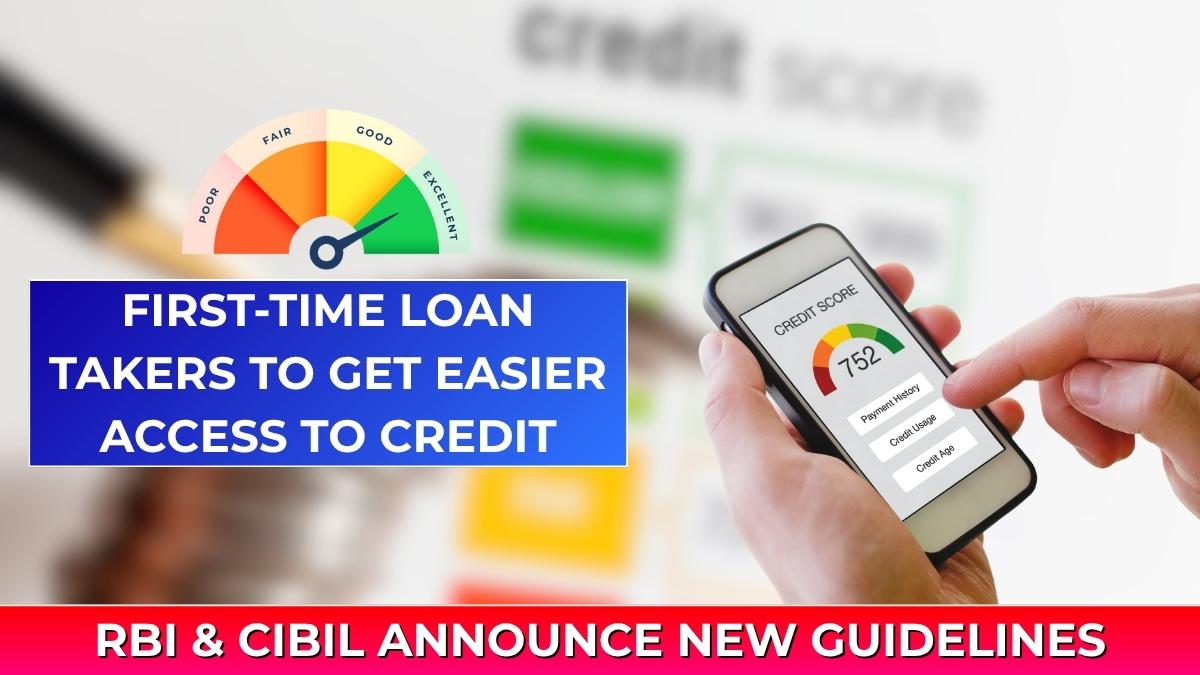If you’ve been planning to take your very first loan maybe a personal loan, car loan, or credit card there’s great news. The new CIBIL Rules 2025 are designed to make life much easier for first-time borrowers.
Let’s break down what’s new, how it helps you, and what to do to make the most of these changes.
What Are the New CIBIL Rules 2025
The CIBIL Rules 2025 are a set of updates introduced to make the credit system in India fairer and more transparent. Earlier, people with no credit history often struggled to get their first loan approved not because they were risky, but simply because they didn’t have a CIBIL score yet.
The new rules change that. They make it possible for lenders to consider alternative data such as your income, bank statement, and payment habits even if you don’t have a CIBIL score. Plus, the system now updates faster and gives borrowers more visibility into their reports.
In short: no credit score ≠ no loan anymore.
When the New CIBIL Rules Apply
Here’s a quick timeline of when these changes kick in and who benefits most:
| Date | What Happens | Who Benefits |
|---|---|---|
| January 1, 2025 | Lenders must update credit data every 15 days instead of once a month. | All borrowers, especially those improving credit quickly. |
| Throughout 2025 | First-time borrowers can apply without a prior CIBIL score; lenders can use other data for evaluation. | New applicants with no credit history. |
| 2025 onward | Borrowers will get alerts when their credit report is checked or when a loan is rejected. | All active and new borrowers. |
That means most of these benefits are already active in 2025 perfect timing if you’re about to apply for your first loan.
How the New CIBIL Rules 2025 Work?
Here’s what’s actually changing and how it affects you in real life:
1. Faster Updates
Earlier, if you paid off a loan or cleared your credit card bill, it could take a month or more to show up in your report. Now updates happen roughly every 15 days.
So if you make a timely payment, your score improves much faster a huge plus if you’re trying to build credit from scratch.
2. Alerts for Credit Checks
Every time a bank or lender checks your credit report, you’ll now get a notification. This keeps you informed and helps prevent misuse of your personal credit data.
3. Easier for First-Time Borrowers
If you don’t have a credit history, lenders can now look at other details like your income, bank activity, rent or utility payments, and other financial behaviour to decide if you’re creditworthy.
4. Clear Reasons for Rejections
If a lender rejects your loan, they must tell you why for example, low income, missing documents, or existing debt. This helps you fix the issue and reapply with confidence.
5. One Free Credit Report Every Year
You can now access one free full credit report per year. It’s a great way to track your progress and check if everything on your record is accurate.
Common Mistakes With the New CIBIL Rules and How to Avoid Them
Even with friendlier rules, a few common errors can still hurt your chances. Avoid these:
- Not checking your report regularly: Take advantage of your free annual report.
- Applying for too many loans at once: Multiple applications create too many “hard checks” and can hurt your score.
- Ignoring notifications: Pay attention to any credit alerts or payment reminders.
- Assuming every lender will ignore CIBIL: Some still prefer a score always ask beforehand.
- Skipping proper documentation: Even if you have no score, your salary slips and bank statements matter a lot.
Best Tips to Make the Most of the New CIBIL Rules 2025
Here’s how to take full advantage of the new system:
- Start small. Try for a low-value personal loan or a credit card with a small limit.
- Pay everything on time. Even one late payment can affect your report.
- Keep your digital footprint clean. Avoid bounced EMIs or cheque returns.
- Monitor your report. Check your credit data every few months for mistakes.
- Don’t over-apply. Choose one or two lenders and apply strategically.
- Use alternative credit products. If available, try “no-score” loans or credit-builder cards designed for beginners.
Latest Updates and Reforms in CIBIL Rules 2025
Here are some key highlights from the latest round of changes:
- 15-day update cycle instead of the old monthly schedule.
- Mandatory rejection reasons when a loan is denied.
- Free annual report and quicker dispute resolution (within about 30 days).
- Alternative credit evaluation for first-time borrowers.
- Alerts for report access or suspicious activity.
These improvements make the lending system fairer, faster, and more secure for everyone especially if you’re just starting out.
Understanding How These Changes Help First-Time Borrowers
For a first-time borrower, these new rules mean:
- You can finally get approved faster even without a past loan record.
- Your good habits matter regular salary deposits, bill payments, and savings can help your case.
- You’ll always know what’s happening with your credit file, thanks to alerts and faster updates.
- You’ll be treated more transparently, since lenders must now give you clear feedback if something goes wrong.
Quick Comparison: Old vs New CIBIL Rules
| Feature | Old System | New 2025 System |
|---|---|---|
| CIBIL score required for new borrowers | Usually mandatory | Not always required |
| Credit report update frequency | Monthly | Every 15 days |
| Loan rejection reason provided | Often not shared | Must be shared with borrower |
| Borrower notification for credit checks | Rare | Now mandatory |
| Access to credit report | Limited or paid | One free report per year |
Why This Is a Big Step Forward
These reforms are more than just a technical update they open doors for millions of people who were previously invisible to the credit system.
It encourages financial inclusion, helps build responsible borrowing habits, and ensures everyone gets a fair shot at credit. Whether you’re a young professional, freelancer, or small business owner, this is your chance to start building a strong credit history from day one.
Conclusion
The new CIBIL Rules 2025 are a major win for first-time loan seekers. You can now apply for credit more confidently, knowing that:
- Your data updates faster,
- You’ll get alerts and transparency,
- You can build credit even without a past record.
The key is to use these benefits wisely borrow responsibly, pay on time, and keep an eye on your report. Within a few months, you’ll be on your way to a solid credit score and more financial freedom.
FAQs
1. When do the new CIBIL rules come into effect?
Most of the new updates started in January 2025 and continue rolling out through the year.
2. What if I have no CIBIL score at all?
You can still apply for a loan lenders can now look at your income, bills, or other financial data to judge your creditworthiness.
3. How quickly will my payments show up in my credit report?
Usually within about two weeks, thanks to the new 15-day update rule.
4. Can my loan be rejected even with these new rules?
Yes, if you don’t meet income or documentation requirements but the lender must tell you exactly why.
5. How can I build a strong CIBIL score fast?
Start small, pay every EMI on time, keep credit usage under 30%, and check your report regularly for accuracy.



